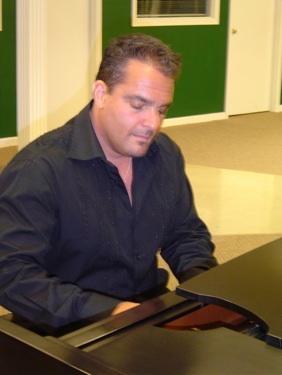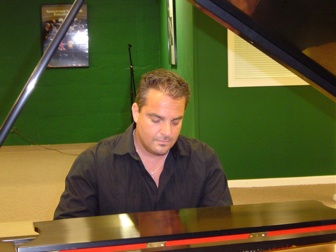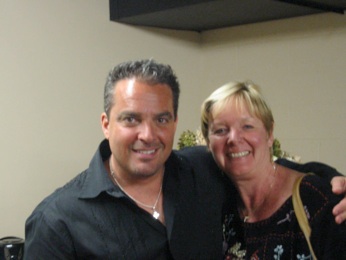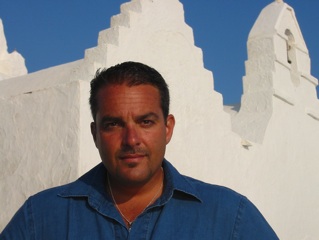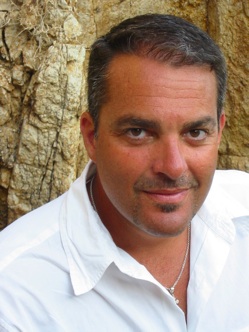
I first heard George Skaroulis’ music when he sent me his “Second Nature” CD to review in early 2003. I had been familiar with his name for several years, but when I was writing for Wind and Wire magazine, George was a favorite pianist of the editor’s, and Bill Binkelman kept those reviews for himself. When I finally heard it, I was blown away by the beauty of George’s music, and we started a correspondence via email. He sent me the rest of his CDs, and I’ve reviewed them over the past couple of years - always amazed by the deep emotion in his music. He also seemed like a really nice guy, so when I heard that he was playing in the Whisperings concert in Birmingham in February, I decided I wanted to go meet him and hear him play live. Knowing it would be hard to talk at the concert, we made plans to meet in Atlanta, GA, where George lives, and see some sights before having dinner. It was an instant friendship, and we had a blast. I’d been thinking about doing an interview with George for some time, but once we got acquainted and I learned more about him, this seemed like a great time to finally do it. I think you’ll have as much fun getting to know him as I have!
George Skaroulis was born and raised in Clearwater, Florida and is one of five children. His Greek heritage is often reflected in his music in a very personal way, and he visits Greece whenever he can. His upcoming CD will be his ninth, and he has been included on at least six compilations albums as well. Here is his story so far:
KP: Are there any other musicians in your family?
GS: My mom was classically trained, but she’s the only one. Dad played clarinet in the high school band, but he was more the quarterback type, so music took a back-seat to football.
KP: When did you start playing the piano?
GS: I was about five years old, sitting next to my mom. She’d play left hand and I’d play right. I’d pick up the melody and we’d play together. Mostly what I learned was old traditional Greek songs, “Heart and Soul,” and things like that. As time went on, I started figuring things out for myself.
KP: How long did you take lessons?
GS: When I was ten, I took lessons for about five weeks. I didn’t have a good teacher, and I got frustrated and quit. She’d play the lesson for me, and I picked it up by ear. She caught on, and didn’t like it. She was too structured and too “nursery-rhymey” for me. I was playing music I heard on the radio - music I wanted to play.
KP: So you just tinkered around on your own between the ages of five and ten?
GS: Yep! I always played at the yearly talent shows in elementary school even though it made me VERY nervous getting onstage. It was scary, but I kept doing it.
KP: How old were you when you wrote your first piece?
GS: I’ve always improvised quite a bit, but it wasn’t until I got one of my keyboards that I actually sat down and wrote something and recorded it. Even though I was creating a lot of music on the piano, after I played a piece one time, it was gone. Once I had a keyboard with a sequencer, I was able to actually record as many as sixteen tracks and layer them. It was about 1994 when I first put anything onto a recording.
KP: When did you go into the restaurant business?
GS: I was fourteen when I had my first job as a busboy in an Italian restaurant. Before that,I had relatives in the Florida panhandle who had restaurants, so when I visited them, I really enjoyed serving drinks and helping out. That’s how I got started in the restaurant business, and I stayed with it for about twenty years. I always wanted to do the music, but never thought I could make a living at it.
KP: You’re in good company there! What made you decide to move to Atlanta from Florida?
GS: My brother and I had a restaurant in Panama City, which is in the Florida panhandle. It’s a beautiful place, but not the most cultural city in the South. Atlanta is about a six-hour drive from Panama City, and it was the only place where you could go to really good concerts. I got a taste for it, and it was a good escape from the little town of Panama City. When we closed our restaurant in ‘92, I decided that I wanted to move to a city that was a little more musically and culturally inclined. Atlanta was the closest move.
KP: What made you decide to go into music full-time?
GS: I was managing and bar-tending in a restaurant next to the Fox Theater here in Atlanta, where I also played the piano once a week. One night, a guy came in for dinner at 10:00, and the piano player for the evening had already left. We should have closed the restaurant, but I felt badly because he needed dinner, so we agreed to serve him. He sat down and asked where the piano player was. He was the only person in the restaurant, so I said I’d play. He was very positive, and eventually told me he was also a pianist. I was kind of shocked! His name was Bradlee Hedrick, and he released his own records and marketed them to the gift industry, which was a completely different approach. I learned a lot from him, and he decided to produce my first album, which was released in 1996 (“Homeland”).
KP: What are you working on now?
GS: It was going to be a lullaby album, but I think it’s actually going to be a children’s album. It will have some original pieces, some traditional lullabies, and songs that have a theme of childhood. I know a lot of parents cringe when they have to listen to the music that their kids want to hear. My concept is making this a piano album that kids will relax to and that the parents will also enjoy. It’s not necessarily going to be a sleepy-time lullaby album, but an album for children and their parents.
KP: Why a children’s album?
GS: I think there is a big need for it. There’s a lot of stuff out there, and there is certainly a big market for it, but there’s room for improvement. People keep asking me to do another Christmas album. A Christmas album only has a shelf life of about three months and is very specific. What else could fill that same niche and not be so limited as far as when I can market it? This just made perfect sense to me. The Christmas album (“Season Traditions”) didn’t take me long to record because it was music I’d been playing since I was a kid. For some people, it’s their favorite album because it’s simple, sweet, and familiar. I feel the same way about a children’s album - it’s music I’ve been playing since I was a kid. If I put a little different twist on it and make it sweet, I think there will be a positive response to it. I feel good about it.
KP: Are you going to place it in children’s stores or gift shops?
GS: Yes, but one of the most obvious places for me to start is hospital gift stores. People go in looking for a last-minute gift when someone has a baby. This is something both the mother and the baby can bond with. When I get close to the final stages, I might approach some companies and parenting magazines for positive response and perhaps support in helping to promote the album. I’m also thinking about some portion of the proceeds going to a children’s charity - I just haven’t decided which one, there are so many! One concept for the cover is using a child who might be the victim of an illness or whatever the album would benefit, but that hasn’t been decided yet.
KP: Where does the name “Evzone Music” come from?
GS: Evzone is a Greek soldier. If you’re in Athens, you’ll see The Tomb of the Unknown Soldier, and guards wearing the Evzone costumes, which are kind of skirted. I have my dad’s costume from when he was a child. He wore it, and then my older brother and I also wore it for Greek occasions like Epiphany when kids dress up in traditional costumes. This costume had been sitting in a paper bag for years, and I always loved it. It almost has the look of a matador’s vest in a dark red velvet, lots of embroidery, and very ornate details in gold and dark red. I have the whole costume including the shoes and hat, and a friend sewed it onto canvas and put it into a plexiglas case. The Evzone costume was sort of my mascot when I first started creating music, and when it came time to name the record label, I decided on Evzone Music.
KP: How long have you been a full-time musician?
GS: About nine years.
KP: How did you get into selling soaps, candles, and pepper mills along with your music?
GS: The big audience for me is people who use my music for massage and relaxation. There are a lot of massage therapists, massage schools, and spas all over that use my music, so when the website began, I thought that if they are coming here for music, we might as well offer things that are complimentary to music - a really good scented candle, natural sponges, or aromatherapy-type soaps. I have a great appreciation for massage therapy and aromatherapy, so I dabbled in creating some of my own products - especially when the “Second Nature” album came out (2003). I love conceptualizing albums, and doing something that makes complete sense as a package, so I decided to develop “Second Nature” products that went along with the CD release. To a very select group of people, we sent a “spa box” and those products were also available on the website.
KP: I got one!
GS: Yes, you did! We only sent out about a dozen of those because it was an expensive freebie, but it caught people’s attention.
KP: You weren’t selling those items before “Second Nature”?
GS: No. I was all part of the rollout for the album. We did our own private labeling on those products, calling them Second Nature Brown Sugar Scrub or Second Nature Verbena Soap, etc.
KP: It looks like most of the soaps, candles, and pepper mills are from Greece.
GS: Most of them are, but some are actually from France. They are good products, not necessarily Greek products. When I go to Greek festivals, I try to keep some things that are specifically Greek. People ask me all the time why I carry pepper mills - I just love lots and lots of fresh pepper. At Greek festivals, people are eating gyros and other Greek specialties, and many come over to my booth to put fresh pepper on their food. Some buy a pepper mill! I know it’s a very weird approach to selling CDs, but when people are in my booth and they’re not necessarily interested in music - they may be interested in something that smells good or is relaxing. They’re drawn in, and then they hear the music and say, “That sounds good. I’ll take one of these CDs, too.” People are drawn to sound in public places, and they’re also drawn to smells. Those are the senses that people are the most likely to respond to, so it’s kind of a magnet.
KP: Are you doing a lot of Greek festivals this year?
GS: I’m doing a few, but they’re exhausting. You set up one day, and then you’re there for three or four days for 10-13 hours a day. I occasionally have back problems, and standing and lifting equipment takes its toll. It’s been a great way to expose people to my music. They can walk up to the booth, put on a pair of headphones, and listen for as long as they like. I hope to do fewer festivals and more documentary work, more film work, and more concerts. I’m doing a few concerts in the next three months that I’m really looking forward to. Some are benefits. A piano teacher here in Atlanta has arranged to do a concert April 3rd at The Unity Church. I’m going to play at two services in the morning, and in the evening, I’m doing a solo concert with three of her students opening the show.
KP: When did you start having young pianists open your concerts?
GS: About five years ago. Because of my dad, I was always doing talent shows when I was a kid. He would encourage me to go to the piano if we were in a piano store, and he got a kick out of watching people gather around this little kid playing the piano. That was fun for me. When I do concerts, I try to find some younger musicians who are beginning to make a name for themselves and invite two or three of them to open my show. It gives them the opportunity to play in front of a real audience on a good piano, and it encourages them because there is wonderful applause. It’s a way of paying back what I had when I was a kid. It’s fun - they bring their families, and it’s a big deal for them. It also adds an element to the concert that makes it kind of special.
KP: Do you have the kids audition for you?
GS: Sometimes, yes. Other times I take the word of the person who is setting up the concert.
KP: Are the kids who open for you usually a little bit older?
GS: It depends on the concert. Some have been as young as eight, some as old as fifteen. Sometimes they get nervous, like everybody else, and that’s how they learn. Regardless, people are supportive of what they do, and that’s what anybody needs to continue. I always talk to them about being nervous, and use the analogy that when you watch The Olympics or you watch ice skating, someone is going to fall - it happens all the time. That doesn’t mean they’re not good - it’s just part of the deal. If they fall down, it’s okay - just keep going. That’s my motivational speech!
KP: Do these kids usually play original music?
GS: It’s mostly classical pieces that they have been practicing with their teacher.
KP: Your music is so peaceful and serene, but sometimes kind of dark. Are you a really easy-going person?
GS: Yeah, I think I’m pretty easy-going. Different periods of my life have different emotions and major things going on that affect what I’m doing. It certainly comes out in my music. Because it’s so close to my heart, I’m always initially very reluctant to put it out there. People may not understand it, but I hope they do.
KP: Who or what have been your biggest musical influences?
GS: I would say David Foster, Mark Isham, Patrick O’Hearn, Randy Newman. Those are all people who do a lot of film music. Even though what I’ve released in the past hasn’t been really thematic film music, it’s what I love to listen to - orchestrated, emotional stuff really captivates me, and that’s what I want to do more of in the future. I listen to a big cross-section of music - pretty much everything but rap. If I had to choose just one genre of music that I really want to excel at, that’s documentary and film work. I just have a feeling that that’s where I belong.
KP: Your music has been used in a couple of documentaries, hasn’t it?
GS: I’ve done some custom work for Georgia Public Television where they send me the footage and I create the music around the scene. I’m working with them on a program called “State of the Arts,” which is kind of an expose on museums, galleries, and performance arts in Georgia. That’s fun and challenging, because you pour your heart into it, and they might not use it in the final cut. I think what has brought the most attention has been the PBS series “Visions of Greece” and “Visions of Italy.” There have been three different programs that have used my prerecorded music as part of the soundtrack. They’re beautifully done, and I’m really proud to be part of them. They also include traditional Greek music as well as the music of other contemporary Greek artists like Chris Spheeris, so it’s a good mixture. It’s been good exposure.
KP: What has been your most exciting musical moment so far?
GS: This may sound kind of boring, but I’d have to say watching PBS and hearing my music along with this beautiful footage - and seeing my name in the credits.
KP: That’s not boring!
GS: I’m sure there have been other moments, but that’s what most stands out for me. That and signing a contract with a Korean record label that licensed my music and put together “Scent of Greece.” I wasn’t sure what they would do with the cover design, and when the demo was sent to me, I was overwhelmed with how beautiful the album was. There is a ten-page booklet that is all in Korean, but it was beautifully done.
KP: Quite a bit of your music seems to be tied to visual arts. “Numinous” was commissioned by an art gallery and “Generations” was inspired by your grandfather’s photos.
GS: It’s like I want to combine what I do with visuals. The art gallery exhibits have been perfect examples of that, but I want to take it step further and do more documentary and film work.
KP: Have you done much in the way of visual arts? Do you draw or paint?
GS: No, no. I love photography - especially portrait photography. I probably picked up that love from my grandfather. He lived on the island of Patmos, Greece until about 1913, when he emigrated to the US. He was one of the few people on this tiny island who had a camera. He wasn’t a professional photographer by any means - he was a restaurant man - but he had a really good eye for photography. He took a lot of photographs before he left Greece, and also when he emigrated. Back in 2000, I had access to a bunch of old family photographs. The negatives were the size of a postcard. They were sepia-toned and very beautiful. I’ve always had a fascination with the early 1900’s, and I adore old family photographs. These had been sitting in a shoe box forever, and I really wanted to bring them back to life. The music for my “Generations” album was created with these images in mind, and was composed as the theme music for an exhibit of my grandfather’s photographs. The music sounds very nostalgic to me. Then I took it a step further, as I wanted this exhibit to be shown first where these pictures came from. So, I shipped three large crates of professionally-framed photographs to Greece at my own expense. I just had to do it. There were thirty images. Some of them were taken Greece, and some were from when my grandfather started establishing a life in the US. There is a wonderful cultural center on the shoreline of Patmos, so that’s where the exhibit was held. Next door, there was an old, very ornate grand piano - probably from the early-1900’s. On this little island, there are no piano tuners, and this piano was pretty beat up. It had also seen a lot of humidity. It wasn’t neglected, but it wasn’t in the best condition. My parents were in Greece two weeks before I arrived for the exhibit, and they said, “We found an old piano - you have to do a concert!” That really wasn’t in my plans because I didn’t think there would be a suitable piano on this island. The mayor and the people at the cultural center arranged to have someone shipped in from Athens, which is a nine-hour boat ride, to tune the piano the day of the show! I was given an award of honor that was placed around my neck, and the mayor gave me a picture book of Patmos. That was a really exciting moment! I was shaking in my shoes.
I played a 30-40 minute concert first. All the locals were there, as well as people from all over the world. This was a free concert and a free exhibit. After the concert, we pulled back the curtains, and people were able to walk into the exhibit to see these photographs. The coolest thing for me was that there were people there who were in these pictures many years ago as children. To see them standing in front of these pictures saying, “That’s me,” or “That’s my mother” was pretty emotional! It was one of the most rewarding things I’ve ever done in relation to my music. Logically and financially, none of it made sense, but I wouldn’t have traded it.
KP: Did you have the CD playing during the exhibit?
GS: Yes, that was the intent - that the CD would be played anytime the photography was on display.
KP: How many places was it shown?
GS: Two. Initially, it was supposed to go to the Consulate in Athens before Patmos, but because of security concerns at that time (in 2001), that was canceled. It went straight to Patmos and then about a year later, a Greek organization sponsored it here in Atlanta. The exhibit was free for three weeks, but the opening night included a concert and a cocktail reception.
KP: How did you like performing with the Whisperings Solo Piano Radio group in Birmingham earlier this year?
GS: I thought it was great! It was a good experience to watch other pianists do their thing. I’ve always been very impressed with David Nevue’s thoroughness in everything he does, and he’s a really smart guy. Sometimes the smallest venues can be the most intimidating. When I’m playing in a bigger venue where there is a stage and there is a separation between me, the piano, and the audience, sometimes it makes it a little bit easier. People were very close, and there were two music reviewers in the very front row (RJ Lannan from New Age Reporter and myself)!
KP: Apparently, we made everybody nervous except David and Michael Dulin!
GS: Everybody played so much better the second night.
KP: Do you have any hobbies?
GS: Photography and cooking; I love to entertain. Photography is probably my main hobby. I also love being outdoors in the sunshine. If it’s a sunny day, I really enjoy driving to the beach, which is about five hours away, or going to the park. I need the sunshine!
KP: Do you have your music on iTunes?
GS: “Second Nature” isn’t on there, but everything else is. We’re getting a good response, so I’m happy about that.
KP: When people pay 99 cents for a download, how much does the artist get?
GS: About 65 cents. It’s not bad. I also just signed a contract with Orange Music in Singapore. They’re going to do three of my releases. They are doing “Return to Homeland” first, and they’re adding a few songs from “Numinous,” which will make it a little bit longer. This is the third foreign license that I’ve had.
KP: Are they also going to have you to go there to do concerts?
GS: Probably down the road. I feel like that would be a really cool experience. I know that Asian cultures are really into the whole piano thing, and I feel like it would be very rewarding.
Many thanks to George Skaroulis for taking the time to share his story with us! To learn more about him and to hear samples of his music, visit
his website and read his many reviews on his
Artist Page here on MainlyPiano.com.
Kathy Parsons
March 2005


